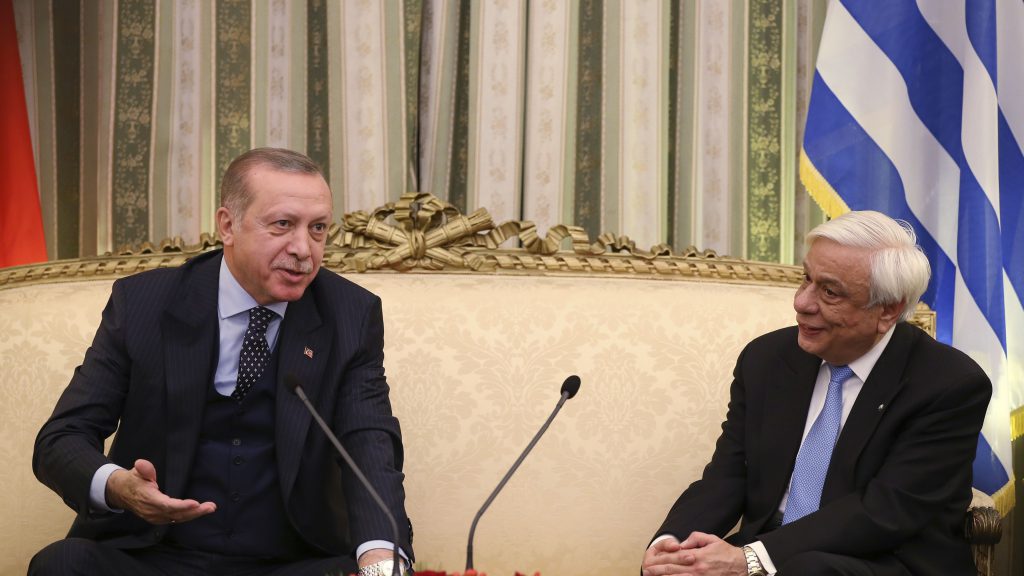There is one example of state leader, proudly bending protocol, during a press conference to express the will of his countrymen and fearlessly stand up against another state leader, a bully hijacking an official visit to claim his territory. It was Hugh Grant, playing a fictional British PM and publicly scolding the villainous US President, played by Billy Bob Thornton. This, of course, happened in the now-classic holiday movie ‘Love, Actually’; both actors played caricature versions of Tony Blair and George W. Bush and the scene was designed to make audiences cheer – one feel-good moment in a film that is a succession of feel-good moments.
Prokopis Pavlopoulos had his Hugh Grant moment on Thursday, during the Turkish President’s historic visit to Athens, the first of its kind in 65 years.
The President of the Hellenic republic saw fit to deviate from protocol and answer to Recep Tayip Erdogan’s statements at a TV interview he had given the previous night, in which he questioned the validity of the Lausanne Treaty and raised issues of a “Turkish” minority in Western Thrace, the appointment process of the region’s Mufti etc.
“Many things have changed in 94 years,” Erdogan said, referring to “outstanding issues” in the treaty that need to be addressed.
President Pavlopoulos chose to confront the Turkish President, saying: “The Treaty of Lausanne defines the territory and the sovereignty of Greece and of the European Union and this treaty is for us non-negotiable. It has no flaws, it does not need to be reviewed, or to be updated.”
A veteran politician (he served as Minister of Interiors in the Karamanlis government, when the latter served as witness to Erdogan’s daughter’s wedding) and a celebrated Proffessor of Constitutional Law knew that it was against protocol to address this issue at his opening statements, with TV cameras running. Erdoğan did not let the opportunity to respond and veer away from protocol himself, stating that he cannot leave this unanswered. He talked about a Greek state “discrimination” against the “Turkish” minority in the Western Thrace, which is home to around 145,000 Muslim Turks and noted that the national income in Greece is around $18,000, while the average in Western Thrace is only around $2,200.
Pavlopoulos in his turn responded and it all escalated to a tense back and forth between the two leaders.
This was not the first time a President of the Hellenic Republic has done such a thing. The late Kostis Stephanopoulos delivered a fiery speech, albeit within protocol provisions, when Bill Clinton had visited Greece, making a harsh critique of the US policies regarding Turkey, Cyprus, Serbia its role in NATO bombings of Serbia, and yes, making reference to the Lausanne Treaty.
It was a historic visit of its own, during which the US President officially apologised for his country’s implication in the 1967-1974 dictatorship.
Many Greeks had cheered at the time, finally seeing a Greek head of state standing up against the all-powerful US leader. Some also cheered yesterday, when they saw the Greek President decisively set out Greece’s non-negotiable hard lines. Not everyone cheered, though. Some felt unease; deeming this as another cringe-worthy moment, Greece offering a Turkish bully the opportunity to make preposterous claims and demands inside the Presidential Residence.
The Opposition didn’t waste any time, making a statement to condemn the Greek Foreign Ministry’s unpreparedness towards one of the most infamously unpredictable state leaders in the world – one that other officials have made a point in avoiding, recently. President of PASOK – and as of recently, leader of the newly established centre-left coalition, Fofi Gennimata was also quick to deem the visit as a “fiasco”, a characterisation swiftly adopted by many critics. Greek media – always divided – also echo this word.
Surprisingly, not even the most devoted to Erdogan media in Turkey were eager to say that Greece was defeated. Reports and analysis confirm the tension and the harsh attitude of both parties, but have no reason to gloat. Because really, Erdogan did not win this.
On the contrary, he had to publicly state, without any doubt, that Turkey has no territorial claims and, more importantly, his questioning of the Lausanne Treaty was shot down by European officials.
The Euractiv media platform quotes a EU official making it clear in reference to the Turkish President that “all candidate countries must respect international treaties”.
So, in the end, did Pavlopoulos make a diplomatic faux-pas? Most probably, yes. His role is primarily ceremonial, meaning that he could not further pursue this dialogue, even if he wanted. He knowingly led the visit to an awkward direction.
But in doing so, he also made Erdogan show his true colours; and he offered the – unprepared, yes – Greek government the chance to put a firm foot down. As for the real subject of the visit, all the trade and political dealings, the energy deals, the nuts and bolts of day-to-day activities, they were discussed in closed doors. It is all business as usual. And it is definitely not love, actually.
